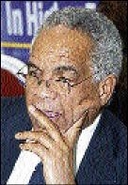Searching for alternatives
Published: Sunday | July 26, 2009

Robert Buddan - POLITICS OF OUR TIME
I attended an economic forum put on by the People's National Party (PNP) at the Jamaica Conference Centre last week. The forum sought to identify the kinds of economic policies and ideas that would inform the party's next manifesto and programmes in government. Its ultimate aim was to see what policies could best achieve social progress. This consideration came against the background of past policies and seeing what changes are needed for both the immediate period and the longer term.
The forum was timely as it turned out, coming two days before the minister of finance made a Cabinet submission for an agreement with the International Monetary Fund (IMF). It also came at a time of parallel sectoral presentations going on in parliament.
structural changes
The conference gave little thrift to 'dollarisation', an idea that Edward Seaga had once again put on to the table. Little was devoted to Jamaica Labour Party's (JLP) ideas of casino gambling and off-shore business either because they faced resistance at home or abroad in one case or the other. But at any rate, the PNP was looking for policies of greater strategic value that would generate deeper structural changes in the economy. There was little else to disagree with the JLP about since the latter was often using PNP policies anyway, except the disagreements over the management of those policies.
Dr Michael Witter of the Department of Economics at UWI gave an overview of the Jamaican economy. His analysis came down to this. The usual sectors were hard-hit exacerbating social problems like unemployment and inequality, especially rural poverty among women and children. It made sense to bring Jamaica's under-utilised resource capacity into production. The kinds of resources he had in mind were both of the traditional kind - human and land - and less traditional ones like marine and water resources.
Witter felt that high-tech farms in the parishes would go a far way to achieve greater resource utilisation and overcome resource constraints.
As Witter spoke, I remembered the Emergency Production Plan he and Professor George Beckford and others developed in 1977 as a possible alternative to the IMF. While he did not present his ideas as alternatives to the IMF, I thought they and many that came after could at least complement those of the GOJ-IMF. Land reform, for example, as co-operative, individual, or corporate, owned or leased for high-tech farms that grew and processed food and raw materials would bring idle resources in the parishes into production.
This would be an alternative to the GOJ-IMF plan building the foundations for export agriculture and agricultural linkages with tourism and manufacturing. If Jamaica Broilers can be growing a little rice and exporting ethanol, surely other companies can invest and diversify their businesses and diversify and strengthen the Jamaican economy at the same time. This would contribute to the deeper structural transformation that the economy needs and which casino gambling and off-shore business by themselves wouldn't alter.
ECONOMIC AND SOCIAL PROTECTION
Omar Davies, the PNP spokesman on finance, drew attention to the need to plan for disaster management through insurance. This is an idea that goes back to 2005 when he was minister of finance developing the Caribbean Catastrophe Risk Insurance Facility and he now believes it is important to have partner countries like Cuba covered for catastrophes in this era of climate change. It is an idea that complements Witter's because agriculture has taken catastrophic blows from Caribbean hurricanes in recent years.
Davies believes we also need to find greater sources of funding for Jamaica's social safety net. The safety net is under strain and will need protection especially under a GOJ-IMF agreement. The PNP takes the position that a GOJ-IMF agreement must protect social gains and that the burden of adjustments must be shared fairly. In this light, the public sector Memorandum of Understanding remains a key plank in the PNP's plans. Davies stressed that social consensus between government and trade unions was important for macro-economic stability.
Keith Duncan, though from the private sector, presented his personal views, many of which would find no objection in the private or public sector. One plan that he has championed across both administrations is debt management to trade more expensive short-term debts for less-expensive, longer-term debts, not a final solution, but which would give breathing space, especially under present circumstances with the IMF.
SECTORAL PLANS
One idea I liked was for the country to set aside the next two years to concentrate on and mobilise for production. I see compatibility here with an emergency production plan too. During this period, and beyond, the public sector should be structured for growth. Wage and salary freezes were not enough. The very economy should be structured for growth. At the moment it is structured for import trading.
Duncan's other idea was for the two main parties to form some kind of partnership for growth and recovery. Of course, he also wants the private sector (the owners of capital) to have a place at the table working closely with the GOJ and Bank of Jamaica on matters such as debt management.
The structure of the conference programme gives an indication of what the PNP sees as priority areas for the present and future. Its sectoral presenters spoke of trade, energy, small and medium enterprises, and science and technology. There is overlap in all of these areas, whether they are to be mobilised for near-term emergency production or for longer term economic transformation.
The National Export Strategy, for example, of which Anthony Hylton spoke, seeks to maximise the contribution of export to social and economic development. This strategy was in the making from 2004 under his ministerial leadership and subsequently launched by this administration. High-tech export agricultural farms could take advantage of export incentives and facilities. A cheaper, cleaner and safer energy mix on such farms and in industry in general would not only make exports and domestic markets more competitive, but would allow energy producers (domestic and industrial) to earn from selling to the national grid and earn more carbon credits for the country. Phillip Paulwell pointed to this plan, which he recently elaborated on in his sectoral presentation to parliament.
Entrepreneurial Centres
Small and medium businesses would be able to support farming and energy industries by manufacturing and servicing inputs and selling and marketing outputs. Dr Henley Morgan was passionate about SMEs and spoke of the plan under the previous administration to establish incubation and entrepreneurial centres to promote them. Dr Wentworth Davidson added that science and technology, when wedded to the health and tourism industries, supported by hi-tech agriculture would create economic linkages of vast benefit to the country.
The economic forum was held in development of the party's Progressive Agenda into which other fora will feed. Portia Simpson Miller stressed that the Progressive Agenda must be outcome-oriented aiming at social and economic progress; and that the Progressive Agenda must be brought o the people and become the people's agenda. Jamaicans are searching for an alternative to the GOJ-IMF programme, which did not include any consultation with Jamaicans. We must, therefore, keep these and other alternatives in mind and bring the people into our production plans.



Paulwell, Davies and Witter
Robert Buddan lectures in the Department of Government, UWI, Mona campus. Email: Robert.Buddan@uwimona.edu.jm or columns@gleanerjm.com.
